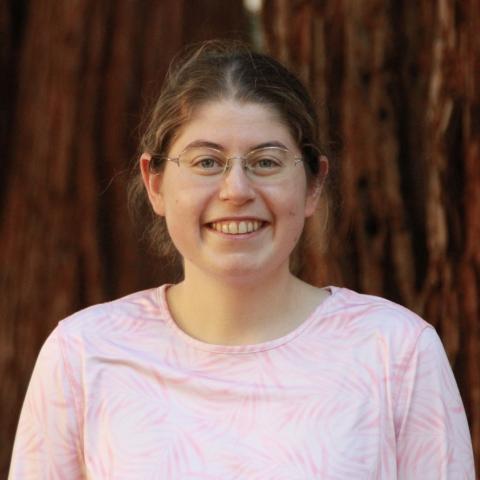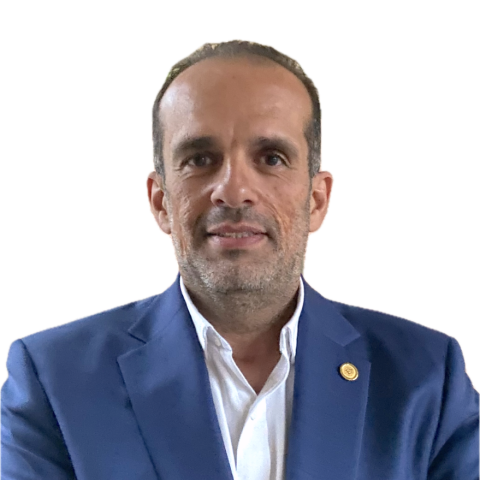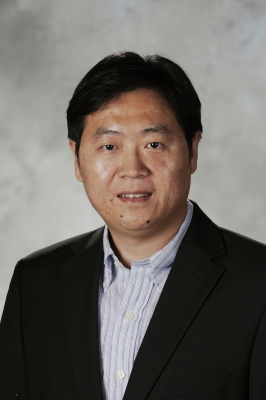Sara Fridovich-Keil

Algorithms & Optimizations
Healthcare
Computational Imaging

Algorithms & Optimizations
Healthcare
Computational Imaging

Azadeh Ansari received the B.S. degree in Electrical Engineering from Sharif University of Technology, Iran in 2010. She earned the M.S and Ph.D. degrees in Electrical Engineering from University of Michigan, Ann Arbor in 2013 and 2016 respectively, focusing upon III-V piezoelectric semiconductor materials and MEMS devices and microsystems for RF applications. Prior to joining the ECE faculty at Georgia Tech, she was a postdoctoral scholar in the Physics Department at Caltech from 2016 to 2017. Ansari is the recipient of a 2017 ProQuest Distinguished Dissertation Award from the University of Michigan for her research on "Gallium Nitride integrated microsystems for RF applications." She received the University of Michigan Richard and Eleanor Towner Prize for outstanding Ph.D. research in 2016. She is a member of IEEE, IEEE Sensor's young professional committee and serves as a technical program committee member of IEEE IFCS 2018.
Sensors and actuatorsMEMS and NEMSIII-V Semiconductor devices

David V. Anderson received the B.S and M.S. degrees from Brigham Young University and the Ph.D. degree from Georgia Institute of Technology (Georgia Tech) in 1993, 1994, and 1999, respectively. He is currently a professor in the School of Electrical and Computer Engineering at Georgia Tech. Anderson's research interests include audio and psycho-acoustics, machine learning and signal processing in the context of human auditory characteristics, and the real-time application of such techniques. His research has included the development of a digital hearing aid algorithm that has now been made into a successful commercial product. Anderson was awarded the National Science Foundation CAREER Award for excellence as a young educator and researcher in 2004 and the Presidential Early Career Award for Scientists and Engineers in the same year. He has over 150 technical publications and 8 patents/patents pending. Anderson is a senior member of the IEEE, and a member the Acoustical Society of America, and Tau Beta Pi. He has been actively involved in the
Audio and Psycho-AcousticsBio-DevicesDigital Signal ProcessingLow-Power Analog/Digital/Mixed-Mode Integrated Circuits

Prof. AlRegib is currently the John and Marilu McCarty Chair Professor in the School of Electrical and Computer Engineering at the Georgia Institute of Technology. His group is the Omni Lab for Intelligent Visual Engineering and Science (OLIVES) at Georgia Tech. In 2012, he was named the Director of Georgia Tech’s Center for Energy and Geo Processing (CeGP). He is the director of the Center for Signal and Information Processing (CSIP). He also served as the Director of Georgia Tech’s Initiatives and Programs in MENA between 2015 and 2018. He has authored and co-authored more than 300 articles in international journals and conference proceedings. He has been issued several U.S. patents and invention disclosures. He is a Fellow of the IEEE.
Prof. AlRegib received the ECE Outstanding Graduate Teaching Award in 2001 and both the CSIP Research and the CSIP Service Awards in 2003. In 2008, he received the ECE Outstanding Junior Faculty Member Award. In 2017, he received the 2017 Denning Faculty Award for Global Engagement. He and his students received the Beat Paper Award in ICIP 2019. He received the 2024 ECE Distinguished Faculty Achievement Award at Georgia Tech. He and his students received the Best Paper Award in ICIP 2019 and the 2023 EURASIP Best Paper Award for Image communication Journal.
Prof. AlRegib participated in a number of activities. He has served as Technical Program co-Chair for ICIP 2020 and ICIP 2024. He served two terms as a member of the IEEE SPS Technical Committees on Multimedia Signal Processing (MMSP) and Image, Video, and Multidimensional Signal Processing (IVMSP), 2015-2017 and 2018-2020. He was a member of the Editorial Boards of both the IEEE Transactions on Image Processing (TIP), 2009-2022, and the Elsevier Journal Signal Processing: Image Communications, 2014-2022. He was a member of the editorial board of the Wireless Networks Journal (WiNET), 2009-2016 and the IEEE Transaction on Circuits and Systems for Video Technology (CSVT), 2014-2016. He was an Area Chair for ICME 2016/17 and the Tutorial Chair for ICIP 2016. He served as the chair of the Special Sessions Program at ICIP’06, the area editor for Columns and Forums in the IEEE Signal Processing Magazine (SPM), 2009–12, the associate editor for IEEE SPM, 2007-09, the Tutorials co-chair in ICIP’09, a guest editor for IEEE J-STSP, 2012, a track chair in ICME’11, the co-chair of the IEEE MMTC Interest Group on 3D Rendering, Processing, and Communications, 2010-12, the chair of the Speech and Video Processing Track at Asilomar 2012, and the Technical Program co-Chair of IEEE GlobalSIP, 2014. He lead a team that organized the IEEE VIP Cup, 2017 and the 2023 IEEEE VIP Cup. He delivered short courses and several tutorials at international events such as BigData, NeurIPS, ICIP, ICME, CVPR, AAAI, and WACV.
In the Omni Lab for Intelligent Visual Engineering and Science (OLIVES), he and his group work on robust and interpretable machine learning algorithms, uncertainty and trust, and human in the loop algorithms. The group studies interventions into AI systems to enhance their trustworthiness. The group has demonstrated their work on a wide range of applications such as Autonomous Systems, Medical Imaging, and Subsurface Imaging. The group is interested in advancing the fundamentals as well as the deployment of such systems in real-world scenarios. His research group is working on projects related to machine learning, image and video processing, image and video understanding, subsurface imaging, perception in visual data processing, healthcare intelligence, and video analytics. The primary applications of the research span from Autonomous Vehicles to Portable AI-based Ophthalmology and Eye Exam and from Microscopic Imaging to Seismic Interpretation. The group was the first to introduce modern machine learning to seismic interpretation.
In 2024, and after more than three years of continuous work, he co-founded Georgia Tech’s AI Makerspace. The AI Makerspace is a resource for the entire campus community to access AI. Its purpose is to democratize access to AI. Together with his team, they are developing tools and services for the AI Makerspace via a VIP Team called AI Makerspace Nexus. In addition, he created two AI classes from scratch with innovative hands-on exercises using the AI Makerspace. One class is the ECE4252/8803 FunML class (Fundamentals of Machine Learning) where students learn the basics of Machine Learning as well as eight weeks of Deep learning both mathematically and using hands-on exercises on real-world data. The second class is a sophomore-level AI Foundations class (AI First) that teaches any student from any college the basics of AI such as data literacy, learning, decision, planning, and ethics using theory and hands-on exercises on the AI Makerspace. Prof. AlRegib wrote two textbooks for both classes.
Prof. AlRegib has provided services and consultation to several firms, companies, and international educational and R&D organizations. He has been a witness expert in a number of patents infringement cases and Inter Partes Review (IRP) cases.
Machine learning, Trustworthy AI, Explainable AI (XAI), Robust Learning Systems, Multimodal Learning, Annotations Diversity in AI Systems

Neuromodulation of peripheral nerve activity real-time control methods applied to electrophysiology measurements Autonomic modulation of visceral organs. Our laboratory combines engineering and neuroscience to tackle real-world problems. We utilize techniques including intracellular and extracellular electrophysiology, computational modeling, and real-time computing.


Raheem Beyah, Ph.D., is associate chair for Strategic Initiatives and Innovation, and the Motorola Foundation Professor in the School of Electrical & Computer Engineering at the Georgia Institute of Technology. His research is at the intersection of the networking and security fields. He leads the Georgia Tech Communications Assurance and Performance Group (CAP), which develops algorithms that enable a more secure network infrastructure with computer systems that are more accountable and less vulnerable to attacks. Through experimentation, simulation, and theoretical analysis, CAP provides solutions to current network security problems and to long-range challenges as current networks and threats evolve. Dr. Beyah has served as guest editor and associate editor of several journals in the areas of network security, wireless networks, and network traffic characterization and performance. He received the National Science Foundation CAREER award in 2009 and was selected for DARPA's Computer Science Study Panel in 2010. He is a member of NSBE, ASEE, and is a senior member of IEEE and ACM. Beyah is a native of Atlanta, Georgia. He received his Bachelor of Science in Electrical Engineering from North Carolina A&T State University in 1998. He received his Master's and Ph.D. in Electrical and Computer Engineering from Georgia Tech in 1999 and 2003, respectively. Prior to returning to Georgia Tech, Dr. Beyah was a faculty member in the Department of Computer Science at Georgia State University, a research faculty member with the Georgia Tech Communications Systems Center (CSC), and a consultant in Andersen Consulting's (now Accenture) Network Solutions Group.
Mobile & Wireless Communications; Network Science

Russell D. Dupuis earned all of his academic degrees from the University of Illinois at Urbana-Champaign. He received his bachelor's degree with "Highest Honors-Bronze Tablet" in 1970. He received his master's in electrical engineering in 1971, and his Ph.D. in 1973. His alma mater has honored him with the University of Illinois Alumni Loyalty Award, and the Distinguished Alumnus Award. Dupuis worked at Texas Instruments from 1973 to 1975. In 1975, he joined Rockwell International where he was the first to demonstrate that MOCVD could be used for the growth of high-quality semiconductor thin films and devices. He joined AT&T Bell Laboratories in 1979 where he extended his work to the growth of InP-InGaAsP by MOCVD. In 1989 he became a chaired professor at the University of Texas at Austin. In August 2003, he was appointed Steve W. Chaddick Chair in Electro-Optics at Georgia Tech in ECE. He is currently studying the growth of III-V compound semiconductor devices by MOCVD, including materials in the InAlGaN/GaN, InAlGaAsP/GaAs, InAlGaAsSb, and InAlGaAsP/InP systems.
Optical Materials, III-V semiconductor devices, epitaxial growth, ultra-dense and ultra-fast optical, interconnects

Wenshan Cai joined the faculty of the Georgia Institute of Technology in January 2012 as an associate professor in the School of Electrical and Computer Engineering, with a joint appointment in the School of Materials Science and Engineering. Prior to this, he was a postdoctoral fellow in the Geballe Laboratory for Advanced Materials at Stanford University. His scientific research is in the area of nanophotonic materials and devices, in which he has made a major impact on the evolving field of plasmonics and metamaterials. Cai has published more than 50 papers in peer-reviewed journals, and the total citations of his recent papers have reached approxIMaTely 10,000 within the past 10 years. He authored the book, Optical Metamaterials: Fundamentals and Applications, which is used as a textbook or a major reference at many universities around the world. He received his B.S. and M.S. degrees from Tsinghua University in 2000 and 2002, respectively, and his Ph.D. from Purdue University in 2008, all in electrical/electronic engineering. Cai is the recipient of several national and international distinctions, including the OSA/SPIE Joseph W. Goodman Book Writing Award (2014), the CooperVision Science & Technology Award (2016), and the Office of Naval Research Young Investigator Award (2017).
Metamaterials; Nonlinear optics; Photovoltaics; Integrated photonics; Plasmonics

Dr. Miranda is a Sr. Research Scientist at the Center for Cyber Operations Enquiry and Unconventional Sensing (COEUS) and an adjunct Professor for the ECE department. Both his research and teaching are focused on cybersecurity and technology risk management.